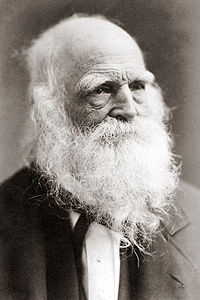From: An Evening Revery
William Cullen Bryant 1794 (Cummington) – 1878 (New York City)
FROM AN UNFINISHED POEM
The summer day is closed--the sun is set:
Well they have done their office, those bright hours,
The latest of whose train goes softly out
In the red West. The green blade of the ground
Has risen, and herds have cropped it; the young twig
Has spread its plaited tissues to the sun;
Flowers of the garden and the waste have blown
And withered; seeds have fallen upon the soil,
From bursting cells, and in their graves await
Their resurrection. Insects from the pools
Have filled the air awhile with humming wings,
That now are still for ever; painted moths
Have wandered the blue sky, and died again;
The mother-bird hath broken for her brood
Their prison shell, or shoved them from the nest,
Plumed for their earliest flight. In bright alcoves,
In woodland cottages with barky walls,
In noisome cells of the tumultuous town,
Mothers have clasped with joy the new-born babe.
Graves by the lonely forest, by the shore
Of rivers and of ocean, by the ways
Of the thronged city, have been hollowed out
And filled, and closed. This day hath parted friends
That ne'er before were parted; it hath knit
New friendships; it hath seen the maiden plight
Her faith, and trust her peace to him who long
Had wooed; and it hath heard, from lips which late
Were eloquent of love, the first harsh word,
That told the wedded one her peace was flown.
Farewell to the sweet sunshine! One glad day
Is added now to Childhood's merry days,
And one calm day to those of quiet Age.
Still the fleet hours run on; and as I lean,
Amid the thickening darkness, lamps are lit,
By those who watch the dead, and those who twine
Flowers for the bride. The mother from the eyes
Of her sick infant shades the painful light,
And sadly listens to his quick-drawn breath.
Oh thou great Movement of the Universe,
Or Change, or Flight of Time--for ye are one!
That bearest, silently, this visible scene
Into night's shadow and the streaming rays
Of starlight, whither art thou bearing me?
I feel the mighty current sweep me on,
Yet know not whither. Man foretells afar
The courses of the stars; the very hour
He knows when they shall darken or grow bright;
Yet doth the eclipse of Sorrow and of Death
Come unforewarned. Who next, of those I love,
Shall pass from life, or, sadder yet, shall fall
From virtue? Strife with foes, or bitterer strife
With friends, or shame and general scorn of men--
Which who can bear?--or the fierce rack of pain,
Lie they within my path? Or shall the years
Push me, with soft and inoffensive pace,
Into the stilly twilight of my age?
Or do the portals of another life
Even now, while I am glorying in my strength,
Impend around me? Oh! beyond that bourne,
In the vast cycle of being which begins
At that broad threshold, with what fairer forms
Shall the great law of change and progress clothe
Its workings? Gently--so have good men taught--
Gently, and without grief, the old shall glide
Into the new; the eternal flow of things,
Like a bright river of the fields of heaven,
Shall journey onward in perpetual peace.
Font size:
Submitted on May 13, 2011
Modified on March 05, 2023
- 2:46 min read
- 60 Views
Quick analysis:
| Scheme | X XXAXXBCXDXEXFXXXXXXXGAXHIXDXCXGJKHXXIL XBKGXXXXILXXMFXXXJMXXXXXXXEBX |
|---|---|
| Closest metre | Iambic pentameter |
| Characters | 2,971 |
| Words | 550 |
| Stanzas | 3 |
| Stanza Lengths | 1, 38, 29 |
Translation
Find a translation for this poem in other languages:
Select another language:
- - Select -
- 简体中文 (Chinese - Simplified)
- 繁體中文 (Chinese - Traditional)
- Español (Spanish)
- Esperanto (Esperanto)
- 日本語 (Japanese)
- Português (Portuguese)
- Deutsch (German)
- العربية (Arabic)
- Français (French)
- Русский (Russian)
- ಕನ್ನಡ (Kannada)
- 한국어 (Korean)
- עברית (Hebrew)
- Gaeilge (Irish)
- Українська (Ukrainian)
- اردو (Urdu)
- Magyar (Hungarian)
- मानक हिन्दी (Hindi)
- Indonesia (Indonesian)
- Italiano (Italian)
- தமிழ் (Tamil)
- Türkçe (Turkish)
- తెలుగు (Telugu)
- ภาษาไทย (Thai)
- Tiếng Việt (Vietnamese)
- Čeština (Czech)
- Polski (Polish)
- Bahasa Indonesia (Indonesian)
- Românește (Romanian)
- Nederlands (Dutch)
- Ελληνικά (Greek)
- Latinum (Latin)
- Svenska (Swedish)
- Dansk (Danish)
- Suomi (Finnish)
- فارسی (Persian)
- ייִדיש (Yiddish)
- հայերեն (Armenian)
- Norsk (Norwegian)
- English (English)
Citation
Use the citation below to add this poem to your bibliography:
Style:MLAChicagoAPA
"From: An Evening Revery" Poetry.com. STANDS4 LLC, 2024. Web. 19 Apr. 2024. <https://www.poetry.com/poem/40284/from:-an-evening-revery>.



Discuss the poem From: An Evening Revery with the community...
Report Comment
We're doing our best to make sure our content is useful, accurate and safe.
If by any chance you spot an inappropriate comment while navigating through our website please use this form to let us know, and we'll take care of it shortly.
Attachment
You need to be logged in to favorite.
Log In